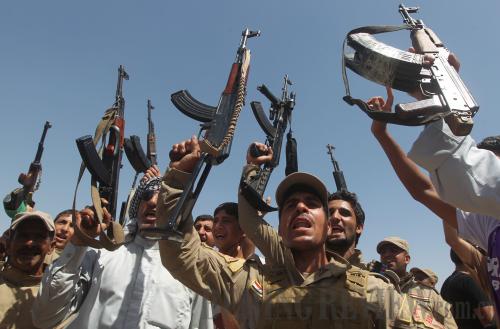|
 |
|
UP IN ARMS: Iraqi Shiite men raise their weapons as they gather in a town in Diyala Province on June 14, to show their determination to defend the country (XINHUA/AFP) |
The Pandora's Box of Iraq was opened in 2003 when Washington kicked off the Iraq War and overthrew former Sunni Iraqi President Saddam Hussein. Even though the last U.S. troops pulled out of Iraq on December 18, 2011, the country failed to find stability after the United States' hit-and-run invasion.
A new wave of terror, violence and conflicts between political and religious factions has swept Iraqis into deep darkness. The experience of the last 11 years shows that, unlike a fairy tale, a sword-wielding prince has not arrived to save the Iraqis. Only by discarding sectarian conflicts and uniting as a whole, can Iraq complete its self-redemption.
A fractured country
The war-torn country has continued to deteriorate in 2014.
In January, the Islamic State of Iraq and the Levant (ISIL), an Al Qaeda breakaway group, declared its aim to create an independent state in the greater Syria-Iraq border area. Militant rebels, in which the ISIL makes the main force, recently advanced with shocking speed in northern Iraq. Insurgents occupied a number of cities there, including the country's second biggest city Mosul. As they marched toward the capital city Baghdad, Iraq once again became a focus of global attention.
"Sectarian divisions still lie at the root of Iraq," Liu Yueqin, a senior research fellow on Middle East studies with the Chinese Academy of Social Sciences (CASS), told Beijing Review.
She pointed out that current Shiite Prime Minister Nuri al-Maliki's party obtained 92 of the 328 seats in the country's National Assembly elections on April 30, resuming its ruling party status. The result caused dissatisfaction among other political groups, especially the Sunnis, leading the ISIL to swoop in. The insurgent groups, spearheaded by ISIL militants, are mainly comprised of the country's Sunnis.
"Sunni soldiers and officers in the governmental army believe that the current Shiite-dominated government has treated Sunnis unfairly, and refuse to fight and die for the Maliki administration, choosing instead to flee from anti-government rebels and bringing about the Iraqi Government's failure in northern Iraq," said Liu.
Maliki fired some senior security officers on June 17 after thousands of Iraqi soldiers and officers abandoned their posts in Iraq's northern province of Nineveh and then in large parts of the provinces of Salahudin and Diyala.
Li Shaoxian, Vice President of the China Institutes of Contemporary International Relations, concluded that the current turmoil in Iraq is the accumulated consequence of Washington's misguided policies.
Li stated that the war in 2003 had buried a landmine for the current chaos in Iraq.
"The war broke the political balance inside and outside Iraq," said Li. The Shiites make up about 60 percent of the country's population; the Kurds, about 20 percent; and the Sunnis, merely 20 percent. He explained that Saddam's rule, wherein the minority of Sunnis were in charge of the country's majority of Shiites, was based on dynamics formed in the country's history. By overthrowing Saddam and propping up Shiites through democratic elections, the United States inevitably broke the traditional political balance inside Iraq, he said.
Moreover, the Iraq War destroyed the regional geopolitical balance formed between the Arabs and the Persians over the past 1,000 years along the Iran-Iraq border. By conducting two wars in Iraq and Afghanistan, the United States actually removed two opponents of its foe Iran—the Taliban and Saddam's administration. After Iraqi Shiites became the ruling force, Iran's influence penetrated into Iraq. Iran, Iraq, Syria and Lebanon connected into a "Shiite plate," posing as the opposite of Saudi Arabia-headed Sunni groups in the Middle East, making the regional situation even more sensitive, said Li.
Furthermore, Washington intended to dismantle Saddam's political structure by implementing a policy of containing the Sunnis, but in fact caused the splintering of the Shiites, the Sunnis and the Kurds in the country. U.S. suppression created a hotbed for the Sunnis' resistance, Li said.
Li added that U.S. President Barack Obama pulled U.S. troops out of Iraq in a rush in 2011 before the Iraqi Government was fully prepared, in effect handing Iraq to anti-government militants. "If U.S. troops hadn't left Iraq so early, the ISIL would not have been able to develop without resistance," Li stressed.
| 